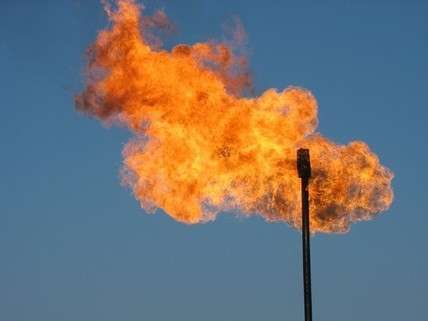Congressional Deregulation Effort Stalls at Methane Rule Repeal
States and industry will seek to roll back BLM's "vast overreach" of regulatory authority in court.

Under the Congressional Review Act that enables Congress to roll back any regulations hastily enacted in the waning days of the previous administration, the Republican majority in the House of Representatives and the Senate have repealed 14 regulations, including three major rules. According to American Action Forum, savings from these Congressional resolutions will amount to $3.7 billion in total regulatory costs using federal agency estimates and up to $36.2 billion in possible savings based on outside and industry calculations.
Today the Senate failed by a vote of 51 to 49 to repeal a Bureau of Land Management rule issued last November that requires the producers of oil and natural gas on federal lands to reduce the emissions of methane associated with flaring and leaks at their wells and other equipment. Three Republicans - Susan Collins (Maine), John McCain (Ariz.), and Lindsey Graham (S.C.) - voted with all of the Senate's Democrats to reject the repeal legislation.
The BLM's rationale for the rule is that by wasting a valuable resource producers are denying taxpayers royalties that would otherwise be collected and that released methane is a potent climate warming greenhouse gas. The BLM estimated that the rule will result in benefits ranging from $209 – 403 million per year and reduce emissions by 180,000 tons per year. The agency predicted that the rule will reduce methane emissions by 35 percent from the 2014 estimates and reduce the flaring of associated gas by 49 percent. Even better, the agency found that the oil and gas industry would actually save between $20 to $157 million per year. In other words, thanks to the wisdom of the bureacrats at the BLM, the oil and gas industry would actually be making more money.
However, the churlish hydrocarbon producers didn't appreciate the efforts of the BLM to boost their profits. Instead, the ingrates countered that industry was already acting to reduce methane emissions including a 38 percent decline between 2005 and 2015 for natural gas producers even as production rose by 33 percent, and a 21 percent decline from oil production since 1991. They also pointed out that boosting natural gas production had resulted in lower overall U.S. greenhouse gas emissions as electricity generators switched from coal to methane. In addition, they blamed the BLM's dilatory approval of pipelines for much of the flaring since that blocked companies from capturing and transporting lots of the gas their wells produced. Finally, several states sued the BLM arguing that the agency had overreached its authority by adopting what are essentially air quality regulations. The litigants assert that the Environmental Protection Agency, not the BLM, is statutorily invested with the power to regulate air quality.
In a statement after the Senate vote, the Western Energy Alliance expressed disappointment calling the BLM rule, "a vast overreach of Executive Branch authority, as BLM usurped EPA and state authority granted by Congress in the Clean Air Act." The group vows to continue to challenge the rule in the courts and to ask newly appointed Secretary of the Interior Ryan Zinke to order a review of the rule with the goal of rescinding it.


Show Comments (31)